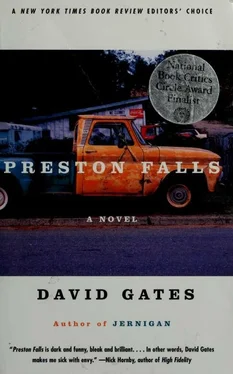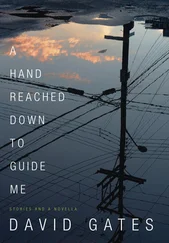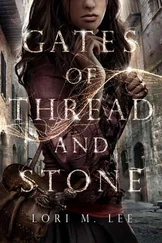"And like in mysticism," Carol says, "they have, you know, light and dark?"
"Can't we just read?" says Roger.
"It totally makes sense that Daddy thinks this is so great," Mel says.
"How so?" says Jean.
"Because he's such a white male."
"In what way?" says Jean. "My little white female?" This must be her night to play dumb.
"I'm not being cute, Mother. First you're like. Oh, this is so important, and now you're treating me like a baby. You don't want to talk because it's about Daddy."
"I'm sorry," Jean says. "That did sound dismissive. Do you want to talk about Daddy? I know you miss him."
"/ don't miss him," says Mel. "I don't even think about him."
"I think he'd be hurt to hear that."
"Why?" says Mel. "He doesn't think about us, right? Why don't you just tell us. Mother? Because we're children?" Jean looks at Carol, who
PRESTON FALLS
turns both palms up. "Every kid in school just about has parents that are divorced or something. It's not a big deal like it was in your day."
"Sweetheart, this is not about divorce," says Jean. "That's not what's going on. And I wish I had something more to tell you, for everybody's sake. But the thing is, right now I don't know exactly where he is or how to get in touch with him. All I can think is that he just went somewhere, maybe to Nonnie's. Or" — does she really want to say this? — "it is possible that he could be in some kind of trouble."
"Yeah," says Mel. "He's probably in jail again."
"He's probably dead," says Roger.
"Shut up, Roger," says Mel.
"Mel? That's not helpful," Jean says. "Your brother's allowed to say what he's worried about. But you know, Rog, if it really was that, we would've heard."
"Fm not worried, I just said it, okay? Are we going to read?"
"Okay, you're not worried. But if you were, you know you can come to me about it, right? And yes, we're going to read in a minute. But I'm glad this finally happened, you know? Because I think we needed to talk about it."
Mel's twirling a strand of hair around her index finger.
"And you know you guys can come to me too," Carol says. "If you don't mind talking to a crazy lady with a truck."
Mel and Roger don't even look at her. Poor Carol does try.
"It's real important right now," says Jean, "that we talk to each other."
"Yeah, right," Mel says. "It's so important that you never tell us anything. Mother, everybody knows Daddy left us."
"Who's 'everybody'?" says Jean. "Mrs. Miller?"
"Her and some other people."
"Great. Look, the minute I know anything, good or bad, I'll tell you guys. Promise. And by the way, I don't think you're too young to handle things. Either of you. You guys are both pretty grown up when you need to be," This pep talk is starting to go wrong: they're not grown up, and they shouldn't have to be. If Willis appeared at the door this minute, she'd slam it in his face. "So listen. It's getting pretty late, but I think we could all stand to zone out a little. Why don't we read to the end of this chapter."
"Yay," says Roger. "Really?"
"Gee, there's quite a bit," says Carol, flipping pages.
2 4 7
"Can I just go to bed?" Mel says.
"Of course, sweetie. Why don't I come up and tuck you in, and Aunt Carol can start reading to Roger."
"No. I don't want you to." Mel gets up and shakes her hair out.
Take her at her word? Probably best. "Okay, sweet," Jean says. "I'll see you in the morning. Sleep tight."
"Yeah, right," says Mel. "Good night, Aunt Carol."
"Night, sugar," says Carol.
Mel just stands there, looking at the picture over the sofa, then turns and heads for the kitchen.
"So," says Carol. "Let's see. Okay. Remember Bilbo's giving him the coat of mail, right?"
As Carol reads, Roger edges closer to her. This hurts Jean, a little. But so long as he can still drop his guard with someone. Mel comes out of the kitchen, looks at them all, then turns and goes upstairs. Jean probably should've taken that look as an invitation to come up and tuck her in after all. She can't pick up the beat tonight.
When Carol gets to the part where Gandalf and Aragorn are arguing about whether to take the mountain pass or the dark and secret way, Roger's snoring. Jean carries him upstairs, pulls the covers over him, brushes the fine hair away from his soft forehead and kisses him. That sweet little-boy smell. And she quickly puts a hand to her eyes to keep the tears from falling on his face and waking him, like in that fairy tale with the candle wax. God, she's weary of being right on the edge.
She plugs in his night-light; the clutter loses its hard edges in the dim glow. Now: where in all this would he hide magazines? She doesn't want to find them, yet ignoring this isn't an option. Damn this world, for allowing all these things that you need to protect children from. Between mattress and box spring is such a cliche she almost doesn't check, but when she slides her hand under, there they are. She sticks her arm in up to the elbow and feels around: okay, just two. She brings them out into the hall to look.
It's two issues of something called Hand Gunner. She feels like weeping in relief that it's not like S & M pornography, then feels stupid for feeling relieved. Here's "Shooting Stances for Street Survival," with a man in a cowboy hat doing poses called "Instinctive" (one hand, like in a Western), "Weaver" (two hands, elbows bent) and "Isosceles" (two
PRESTON FALLS
hands, arms straight). Here's "Ammo Insight." A column on why every handgun should have a "laser sighting device." Lots and lots of handgun ads. One shows a little safe you keep by your bed with your handgun in it. Surrounded by thick steel and cradled in soft foam, it's safe from curious fingers and waiting for that moment you hope never comes. But if it does, you know you can get to your handgun in seconds in the dark. Its tactile contours guide your fingers to the computerized control panel. You enter your code. The door instantly springs open. You've got your gun. This is too right wing to even think about, but it makes a kind of sense. The kids couldn't get at it. And she's here all alone.
So she'll tell Roger she found the magazines while turning his mattress. She'll say they're inappropriate — which he already knows, or why is he hiding them? — and he'll say nothing. She'll want to ask who sold these to him, but there's probably no law against selling gun magazines to children, and anyhow the real issue is what's going on with Roger. So she'll ask what he likes about guns. She won't preach. He still won't give anything away; it will be one more of those Roger dead ends. She's already lost him.
But she can't let that thought take root.
That night Jean wakes up and the bed's shaking. It must be an earthquake. She looks at the clock: 3:21. She's never been in an earthquake before. Isn't Westchester County supposed to be the most stable area in the world, geologically? The bed keeps shaking. It must be her, making the bed shake. Her whole body is shaking.
In the morning it strikes her that what's inappropriate isn't the magazines so much as the secrecy. Roger's face gets red when she tells him about turning the mattress. He wasn't hiding the magazines — he had them there so they'd stayT?^/. Jean ignores this and says that when she was a girl, she used to think she had to hide things from her parents when it usually turned out they were cool about it. An utter and absolute lie, of course, but Roger isn't even interested enough to ask what she hid.
At the station, she shoulders the yellow nylon duffel bag with her stuff for Atlanta, like a Let's Go! Europe college girl among all these serious commuters. Who actually do bustle around with briefcases, as if in some dance routine satirizing the 1950s. The sky's a clean bright blue after last night's storm, and up on the platform there's a cold wind whipping.
Читать дальше










